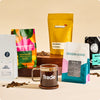Coffee processing methods — the way in which the fruit of the coffee cherry is removed from the seed — is one of the most important factors regarding coffee taste. And in between the most common methods, washed processing (in which all of the fruit is removed before drying) and natural processing (in which the fruit dries before being separated) lies the honey process, so called because the sticky mucilage left on the seed during drying is referred to in Spanish as “miel,” a word that also means honey.
The method, of making honey coffee, also known as pulped natural processing method, yields coffees that can be brighter and cleaner than naturally processed coffees, but also more syrupy than washed ones: a spacious and delicious middleground.

Costa Rica has been one of the countries at the vanguard of honey processing, and this natural coffee, which couches a stone fruit sweetness in a whole bunch of chocolate and caramel flavors, is a great example of the kinds of coffee it produces.
Metric Costa Rica Javier Solis

Brazil was the birthplace of honey processing, which can produce a slightly more lively flavor profile than the traditional natural process coffees from that country. There’s a little citrus and a little raisin in this one but, don’t worry, plenty of the chocolate, nut, and caramel notes you love in Brazilian coffees as well.

The combination of clean citrusy flavors and a huge, syrupy body make this coffee a terrific study of what this processing method can do. Think juicy orange acidity and tons of caramel, both in how this coffee tastes and feels.

This Central American honey processed coffee stands out in its intense floral and spice aroma and delicate fruity flavor. It was grown in Panama from heirloom Ethiopian coffee varieties, which makes it a pretty rare bird on top of being totally delicious.
If you’re interested in learning more about other coffee brewing methods like the washed coffee process or want to try different coffee blends, visit Trade. From natural coffee to washed coffee, we’ve here to help find the best brew for you!





